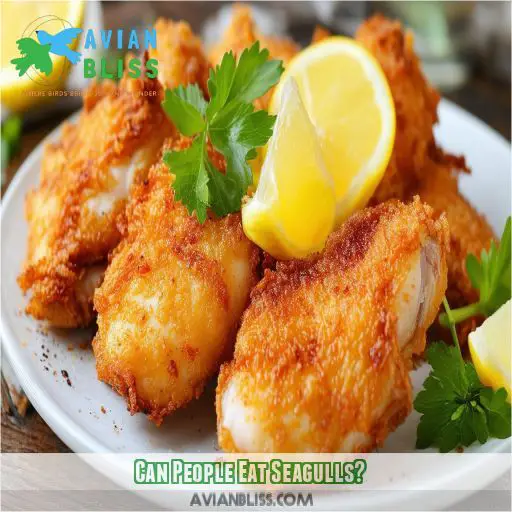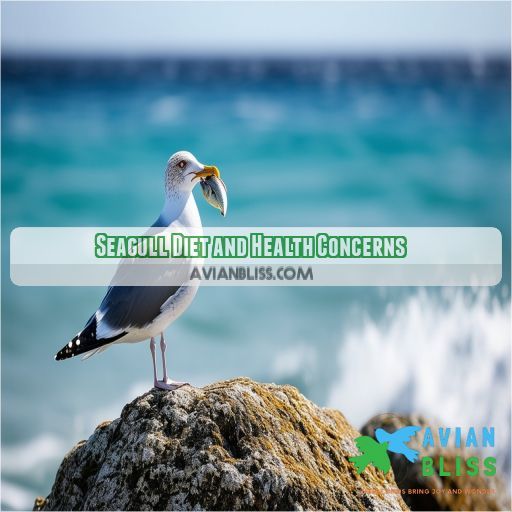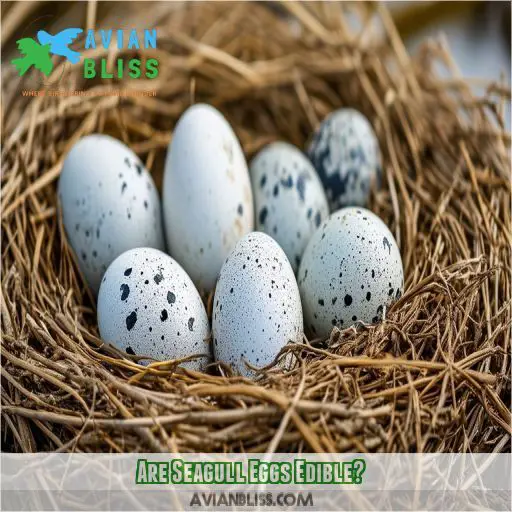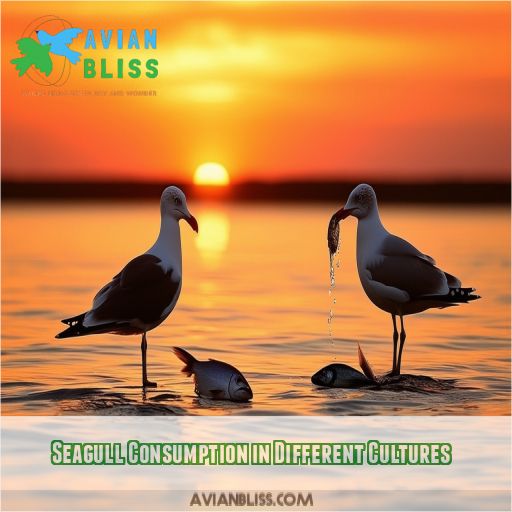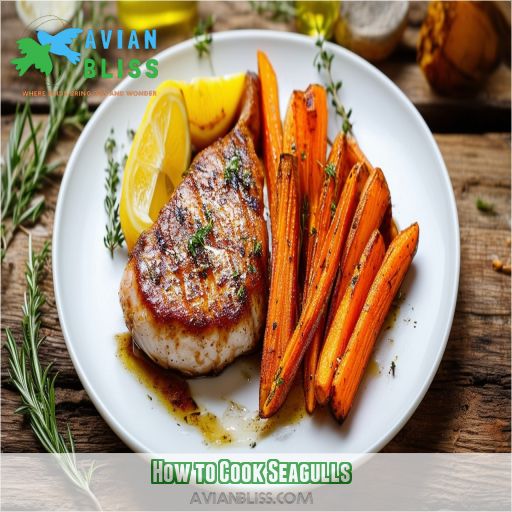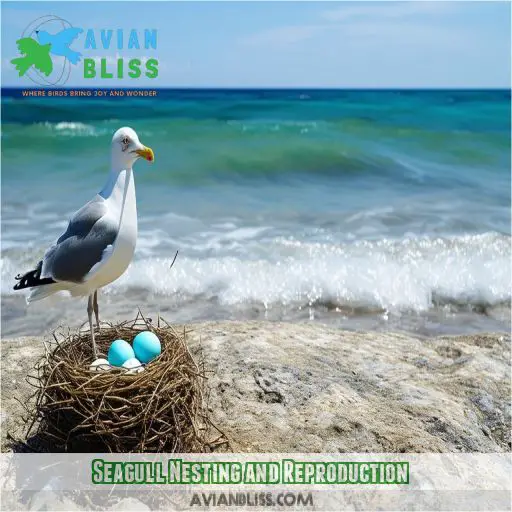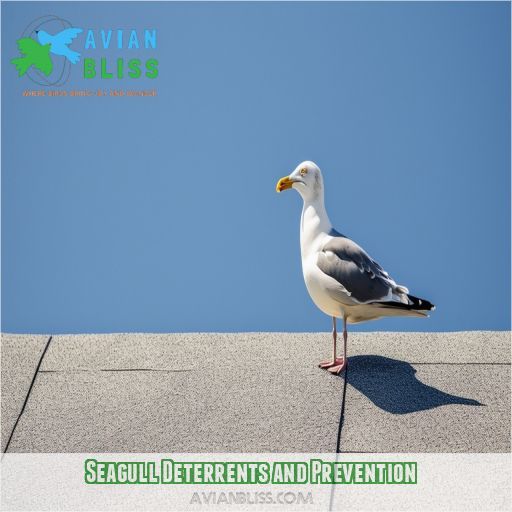This site is supported by our readers. We may earn a commission, at no cost to you, if you purchase through links.
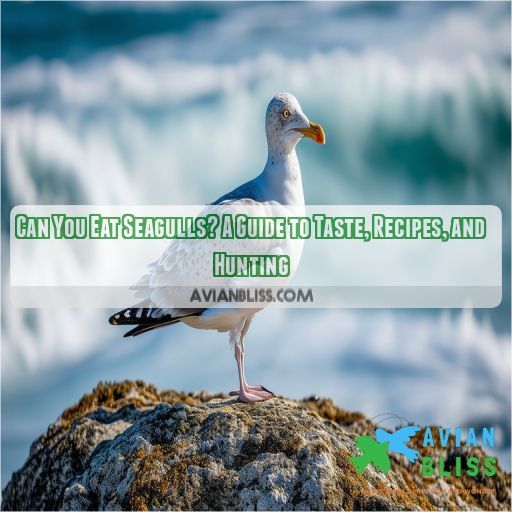
Seagulls are a common sight near coasts and on inland waterways, but most people don’t consider them a food source. In this article, we’ll explore whether seagulls are edible, what they taste like, and the health concerns associated with consuming them. We’ll also investigate the cultural significance of seagull consumption and provide some insights into hunting and cooking these birds.
Table Of Contents
- Key Takeaways
- Can You Eat Seagulls?
- Can People Eat Seagulls?
- Seagull Diet and Health Concerns
- Are Seagull Eggs Edible?
- Seagull Consumption in Different Cultures
- How to Cook Seagulls
- Seagull Hunting and Regulations
- Seagull Nesting and Reproduction
- Seagull Conservation and Protection
- Seagull Deterrents and Prevention
- Frequently Asked Questions (FAQs)
- What cultures eat seagulls?
- Are seagull eggs edible?
- Can you hunt seagulls?
- How many calories are in a seagull?
- Do seagulls have any nutritional value?
- What is the best way to catch a seagull?
- What are the risks of eating raw seagull meat?
- Are there any cultural taboos around eating seagulls?
- Are seagulls a protected species?
- Conclusion
Key Takeaways
Seagulls are technically edible, but the experience is akin to chewing on a rubber shoe paired with the aftertaste of garbage breath. Seagull eggs are considered a delicacy in certain cultures, but acquiring them is no easy feat – they are protected and guarded with utmost vigilance. In many places, hunting seagulls is illegal, so it’s best to admire them from a distance and respect their role in the ecosystem. Like all wildlife, seagulls deserve our respect and the freedom to exist peacefully in their natural habitats.
Can You Eat Seagulls?
Yes, it is technically possible to eat seagulls.
However, it is not recommended due to health and ethical concerns.
Health concerns: Seagulls are scavengers and can carry harmful bacteria such as E. coli and Salmonella. They also have a low nutritional value and a tough, stringy texture.
Ethical concerns: While seagull eggs are edible and similar to other bird eggs, it is best to stick to conventional food sources.
Can People Eat Seagulls?
Technically, seagulls are edible, but there are many reasons why you shouldn’t eat them. For starters, seagull meat doesn’t offer much in terms of nutritional value, and it has a tough, stringy texture. It’s also not very tasty, especially if the seagulls have been feasting on garbage instead of fish. Plus, there’s the risk of getting sick—seagull meat can carry diseases and illnesses.
If you’re thinking of hunting seagulls, you should know that it’s illegal in some places, like New Jersey, and seagulls are protected by federal law. So, while you could eat seagulls if you really wanted to, it’s probably not worth the effort or the risk.
Seagull Diet and Health Concerns
Now that you know whether or not you can eat seagulls, it’s important to understand their diet and the potential health concerns associated with consuming them. Seagulls are scavengers with a flexible diet, consuming anything from fish and insects to human leftovers and even waste. This diverse diet makes them a haven for bacteria, including E. coli and Salmonella, which can cause serious illnesses. In fact, there have been suspicions that seagulls have been served as chicken in some Chinese restaurants, leading to health concerns and even restaurant closures.
While seagulls may be a source of food in some cultures, it’s important to exercise caution due to the potential health risks involved. It’s always better to stick to more conventional food sources and leave seagulls to play their part in the ecosystem.
Are Seagull Eggs Edible?
While seagulls themselves may not be the most appetising meal, their eggs are a different story. Seagull eggs are edible and have been consumed by various cultures for centuries. In fact, they’re considered a delicacy in some parts of the world, like Japan.
Here are some key points to explore about seagull eggs:
- Seagull eggs have a similar nutritional value to other bird eggs, such as duck eggs, and can be prepared in the same ways, including scrambling, boiling, or frying.
- The taste of seagull eggs can vary depending on the diet of the birds. Some describe the flavour as slightly fishy, while others say it’s similar to chicken eggs.
- Seagull egg yolks are typically deep orange or red and are richer and creamier than chicken yolks.
- In areas where it’s legal, seagull eggs are collected and eaten. For example, residents of the Vargas Islands in Clayoquot Sounds have a long history of collecting and preparing seagull eggs, with some gathering up to 200 eggs per trip while ensuring they leave at least one egg behind per nest to avoid devastating the population.
Seagull Consumption in Different Cultures
While seagulls aren’t a common food source today, there’s a history of seagull consumption in certain cultures, particularly in coastal regions. People from the Orkneys, Shetlands, and St Kildas are known to have included seagulls in their diet in the past. This was likely due to the abundance of these birds in their local environment.
In some indigenous cultures of the Northwest Coast, such as the Nootka, Haida, and Kwakiutl, seagulls held cultural significance and were harvested for their meat and feathers. Seagulls were also consumed during times of scarcity, such as by airmen during war, further highlighting the survival value of this bird.
| Culture | Region | Historical Consumption |
|---|---|---|
| Indigenous Peoples | Northwest Coast | Seagull meat and feathers |
| Orkney, Shetland, St Kilda | Scotland | Food source |
| Airmen | Worldwide | Survival food |
Seagulls have also found their way into literature and art, often symbolizing freedom and the untamed nature of the sea. Their association with the ocean and coastal areas has led to their inclusion in stories and artwork, adding a touch of wildness and a sense of the unknown.
How to Cook Seagulls
To cook seagulls, soak them in saltwater for eight hours to reduce the fishy taste, then simmer with herbs for three hours. Remember to discard the pan afterward due to the lingering strong scent.
Seagull Taste and Preparation
If you’re considering eating seagulls, you might be wondering about their flavour, texture, and nutritional value. Well, seagulls have:
- A unique flavour profile influenced by their diverse diet.
- A tough, stringy texture.
- A reasonable amount of protein, but their scavenging habits might put you off.
- A high oil content.
Seagull Recipes
While seagulls aren’t a common food source, you might be interested in some seagull-inspired recipes from folklore, literature, or film. However, it’s important to remember that seagulls are protected by law in many places and shouldn’t be hunted or consumed.
Seagull Hunting and Regulations
Hunting seagulls is illegal in most places, and even where it’s legal, it’s not recommended due to ethical and safety concerns. Here are some key considerations regarding seagull hunting:
- Seagull Meat Safety: Seagulls are scavengers, and their diet can include garbage and other contaminated sources. This means their meat may carry diseases and illnesses, posing health risks to consumers.
- Seagull Hunting Ethics: While seagulls can be a nuisance in some areas, hunting them is generally not considered ethical. As sentient beings, their welfare should be respected, and alternative methods of population control should be explored.
- Seagull Population Control: In areas where seagulls are overpopulated and causing issues, trapping and relocating them is a more humane approach to managing their numbers. This method makes certain that seagull populations can be controlled without causing unnecessary harm.
- seagull conservation Efforts: Two seagull species in the UK are on the Red List due to population decline. Hunting seagulls can further endanger these species and disrupt the ecosystem. Conservation efforts should focus on protecting and preserving their habitats and food sources.
Seagull Nesting and Reproduction
Seagulls are highly protective of their nesting sites, which can include sea-cliffs, dunes, islands, and even rooftops. They choose these locations to form colonies, as there’s safety in numbers. During the breeding season, which lasts from April to September, seagulls become even more territorial.
| Nesting Sites | Breeding Season | Colony Protection |
|---|---|---|
| Sea-cliffs | April-September | Safety in Numbers |
| Dunes | Monogamous | Protection from Predators |
| Islands | Mate for Life | Rooftops |
Seagull Conservation and Protection
As a protected species, seagulls are safeguarded by laws such as the Wildlife and Countryside Act of 1981, which prohibits any actions that may harm or disturb them.
Licences for control measures are rarely granted.
The seagull population is in decline, and this is further evidenced by the fact that two species of seagull are currently on the UK Red List.
To ensure the protection of seagulls, it is imperative that we address the issues of habitat destruction and implement effective population management strategies.
Research funding and public awareness campaigns are vital components in the conservation effort.
Seagull Deterrents and Prevention
As seagulls are protected by law, it’s crucial to investigate humane methods of seabird management. These coastal nuisances can be a challenge for urban sanitation, but you have options for wildlife control:
- Avoid littering and secure your trash to reduce food sources.
- Respect gull chicks and nests, especially during mating season.
- Install physical deterrents like wire systems or anti-bird spikes to prevent nesting.
- Utilize decoys, optical illusions, or sonic devices to create an unwelcoming environment.
Frequently Asked Questions (FAQs)
What cultures eat seagulls?
People in the Faroe Islands eat seagulls, and historically, people in the Orkneys, Shetlands, and St. Kildas consumed them. Icelanders eat puffins, which are similar to seagulls.
Are seagull eggs edible?
Some say they taste fishy, like a cheddar cheese omelet, while others say they taste like chicken eggs—only saltier. If you’re near the coast, you can find them in June, but it’s tough to get your hands on them as there are only 12 licensed gull egg collectors in the UK.
Can you hunt seagulls?
Hunting seagulls is illegal in some places, such as New Jersey, but it’s permitted in certain areas with specific restrictions, like Saint John, where they must be caught by hand.
How many calories are in a seagull?
Like a small chocolate bar, a cup of seagull meat contains about 300 calories. However, eating seagulls isn’t recommended due to their poor taste and low nutritional value.
Do seagulls have any nutritional value?
Seagull meat is high in protein and exceptionally oily. It’s also low in saturated fat and cholesterol. However, seagulls are protected by law in many places, so hunting them is illegal.
What is the best way to catch a seagull?
A funnel trap is the best way to catch seagulls. Set up a square structure with posts and drape a net over it, leaving an entrance for the seagulls. Use bait, like French fries, to lure them into the trap. Once a seagull enters, quickly run to the trap and catch it by the leg.
What are the risks of eating raw seagull meat?
Eating raw seagull meat is generally not considered safe due to the risk of food poisoning from salmonella and other bacteria. If you choose to eat raw seagulls, clean the bird thoroughly and cook it well to reduce the risk of illness.
Are there any cultural taboos around eating seagulls?
While seagulls are edible, they’re often depicted as pests, scavengers, and nuisances. This perception may contribute to cultural taboos around consuming them. In some regions, seagulls are protected by law, and hunting them is prohibited, further emphasizing their cultural status.
Are seagulls a protected species?
Yes, seagulls are a protected species. They’re safeguarded by the Migratory Bird Treaty Act of 1918 in the US, Canada, Mexico, Russia, and Japan. In the UK, the Wildlife and Countryside Act 1981 protects them, and it’s illegal to kill, injure, or destroy their nests.
Conclusion
While seagulls are edible, it’s imperative to weigh the health risks associated with consuming them.
This article explored the fascinating realm of seagull cuisine, from flavor and recipes to hunting and conservation.
We discovered that seagull eggs are also edible and explored the cultural significance of seagull consumption.

